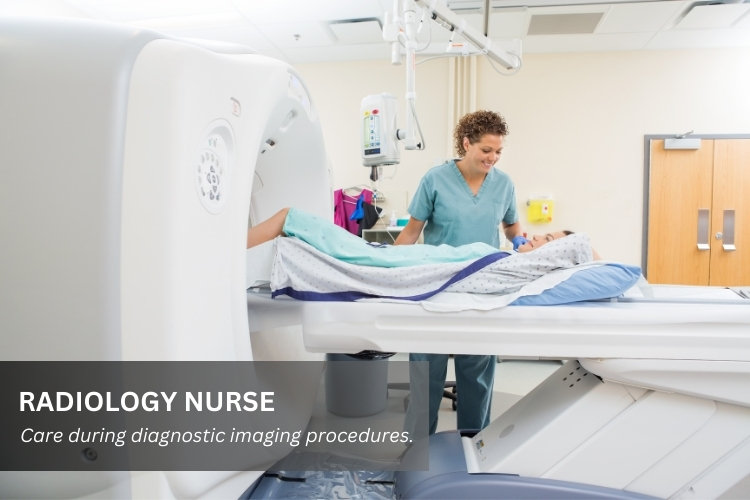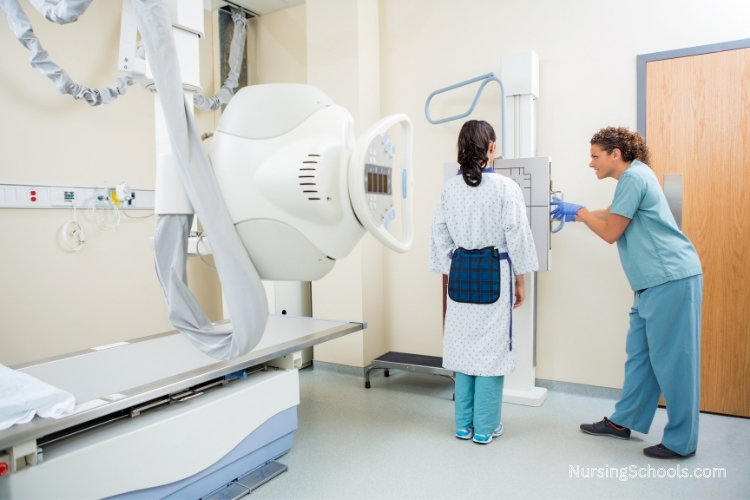Radiology Nurse
Healthcare Career Guide

Modern diagnostics and treatment rely heavily on imaging, and Radiology Nurses are at the center of patient care throughout the process. These specialized nurses assist with procedures such as MRIs, CT scans, and interventional radiology, ensuring patient safety, comfort, and preparation before, during, and after imaging. They often work alongside radiologists, technologists, and anesthesiologists in fast-paced hospital settings, outpatient clinics, or surgical centers. Let's delve into the Radiology Nurse specialty and explore what it takes to thrive in this highly technical nursing role.
Overview
What Is a Radiology Nurse?
A Radiology Nurse, also known as an Imaging Nurse, specializes in providing care to patients undergoing diagnostic and interventional radiology procedures. These nurses assist in medical imaging exams such as X-rays, CT scans, MRIs, ultrasounds, and fluoroscopy-guided procedures.
Radiology Nurses work in hospitals, outpatient imaging centers, and specialty radiology clinics. They help prepare patients for imaging tests, administer contrast dyes, monitor vital signs, and provide post-procedure care for those undergoing interventional treatments such as angiograms and biopsies.
This career requires strong technical skills, knowledge of radiologic procedures, and the ability to provide patient education and support in a fast-paced environment.
Education
How Do I Become a Radiology Nurse?
Becoming a Radiology Nurse requires a combination of traditional nursing education, clinical experience, certification, and specialized training in imaging-based medical procedures and patient care. Follow these steps to enter this challenging and rewarding healthcare career:
- Earn a Nursing Degree. Complete an Associate Degree in Nursing (ADN) or Bachelor of Science in Nursing (BSN). A BSN is preferred for specialized radiology nursing roles.
- Pass the NCLEX-RN. Obtain your nursing license by passing the National Council Licensure Examination for Registered Nurses (NCLEX-RN).
- Gain Clinical Experience. Work as a Registered Nurse (RN) in medical-surgical units, emergency departments, or intensive care units to develop foundational nursing skills.
- Obtain Radiology Nursing Certification. Consider earning the Certified Radiology Nurse (CRN) credential through the Radiologic Nursing Certification Board (RNCB) to demonstrate expertise in radiology nursing.
- Continue Professional Development. Stay updated with advancements in imaging technology, contrast dye administration, and interventional radiology techniques through continuing education.
On average, it takes 4-6 years to become a Radiology Nurse, including nursing school, licensure, and obtaining specialized training. Certification enhances job prospects and credibility in this field.

Average Salary
How Much Does a Radiology Nurse Make?
Salaries for Radiology Nurses vary based on experience, location, and work setting. On average, a Radiology Nurse can expect to earn between $80,000 and $110,000 annually.
Average annual salary for a Radiology Nurse:
- Entry-level: $80,000 - $90,000 per year.
- Mid-career: $90,000 - $100,000 per year.
- Experienced: $100,000 - $110,000 per year.
The U.S. Department of Labor reports that Radiology Nurses earn an average hourly wage of approximately $42.00 per hour. Assuming a 40-hour workweek, this equates to an annual salary of $87,360. The lowest 10% earn less than $36.00 per hour, while the highest 10% earn more than $50.00 per hour, resulting in an annual salary range of $74,880 to $104,000 per year.
Job Duties
What Does a Radiology Nurse Do?
Radiology Nurses provide specialized care for patients before, during, and after diagnostic imaging and interventional procedures. Their role includes patient education, contrast dye administration, and vital sign monitoring.
The most common job duties of a Radiology Nurse:
- Preparing Patients for Imaging Procedures. Assess patient history, explain imaging tests, and address concerns before procedures.
- Administering Contrast Agents. Safely inject contrast dyes for CT scans, MRIs, and fluoroscopy-guided procedures.
- Monitoring Patients During Procedures. Observe for adverse reactions to contrast dyes and ensure patient stability.
- Assisting in Interventional Radiology. Support minimally invasive image-guided procedures such as angioplasty, biopsies, and catheter placements.
- Managing Sedation and Pain Control. Assist with conscious sedation for patients undergoing complex radiology procedures.
- Providing Post-Procedure Care. Monitor patients for complications, educate them on aftercare, and ensure a safe recovery.
- Collaborating with Radiologists and Technologists. Work as part of an interdisciplinary team to optimize patient outcomes.
- Advanced Duties. Experienced Radiology Nurses may specialize in interventional cardiology, nuclear medicine, or radiation oncology.
Radiology Nurses typically work in hospitals, outpatient imaging centers, interventional radiology units, and specialty clinics. Their role is essential in ensuring safe and efficient imaging procedures for patients.

Essential Skills
What Skills Does a Radiology Nurse Need?
Radiology Nurses require a mix of clinical expertise, technical skills, and patient education abilities. These skills enable them to effectively support patients undergoing diagnostic and interventional imaging procedures.
Here are some of the skills a Radiology Nurse needs to succeed:
- Patient Assessment. Evaluate patient history, allergies, and contraindications for contrast agents.
- IV Insertion and Contrast Administration. Safely administer IV contrast dyes for imaging studies.
- Critical Thinking. Quickly assess and respond to patient reactions during imaging procedures.
- Pain and Sedation Management. Assist with conscious sedation and ensure patient comfort during procedures.
- Collaboration. Work closely with radiologists, technologists, and anesthesiologists to coordinate patient care.
- Radiology Equipment Knowledge. Understand the basics of CT, MRI, ultrasound, and fluoroscopy-guided procedures.
- Patient Education. Explain procedures, expected sensations, and post-procedure care to patients.
- Emergency Response. Recognize and respond to contrast reactions, anaphylaxis, or sedation-related complications.
One of the biggest challenges of being a Radiology Nurse is managing patients with anxiety about imaging procedures while ensuring their safety during contrast administration. However, the role is highly rewarding, as it allows nurses to assist in life-saving diagnostic procedures and interventional treatments.
Last updated: March 13, 2025
References:
- Registered Nurses. Bureau of Labor Statistics, U.S. Department of Labor. Occupational Outlook Handbook. Retrieved March 13, 2025.
- NCLEX Nurse Licensure Exam. National Council of State Boards of Nursing (NCSBN). Retrieved March 13, 2025.
- Radiology Nurse. Johnson & Johnson, Nursing Careers. Retrieved March 13, 2025.
- Radiology Nurse Salary in the United States. ZipRecruiter, Healthcare Career Path. Retrieved March 13, 2025.
- Radiology Nurse Professional Organization. The Association for Radiologic and Imaging Nursing (ARIN). Retrieved March 13, 2025.
- Certified Radiology Nurse (CRN). Radiologic Nursing Certification Board (RNCB). Retrieved March 13, 2025.
- What is a radiology nurse. Indeed, Healthcare Career Guide. Retrieved March 13, 2025.
- Radiology Careers. Gwynedd Mercy University, Career Guide. Retrieved March 13, 2025.
- Recognizing the Role of Nurses in the Growth of Radiology Services at UCSF. The Regents of the University of California (UCSF), Patient Care. Retrieved March 13, 2025.


